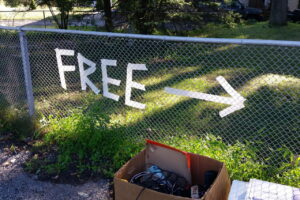Isaiah 35: 4-7a; Psalm 146; James 2: 1-5 (RM) or 1-10, 14-17 (RCL); Mark 7: 31-37 (RM) or 24-37 (RCL.)
Why tell a good story when you can tell a great story?
Even better, tell both stories, one after the other.
This Sunday the Roman Missal (RM) gives us one Gospel story, that of the man who could not hear and could not speak clearly. In what one commentator calls a “parable in action” Jesus uses touch, spittle and the soil of the earth to effect the healing of the man’s condition. Healing in itself is an absolute good. But the writer of Mark tells these stories with a larger overarching purpose: to demonstrate that the reign of God has come, even as the writer depicts Jesus as constantly trying to suppress the news of his actions. This is called the “Messianic Secret”— Jesus instructs the witnesses not to tell anyone, yet the word spreads.
The First Reading from Isaiah provides a perfect introduction to both ideas – that those who cannot hear will hear, those who cannot speak will speak – moreover that this great healing phenomenon foreshadows the reign of God in the repair and renewal of all creation. Streams of water will gush forth in the desert, “the burning sand become a pool,” and there is no longer any reason for fear, because of the coming of God. Universal healing and life-giving fertility is a cosmic sign of God’s presence and powerful action, ushering in the Messianic Age.
But in the Gospel reading from Mark, the jaw-droppingly fabulous “He said what? She said what?!!” story precedes that of the healing of the person who could not hear or speak. It’s missing entirely from the Gospel reading in the Roman Missal but it appears in the Revised Common Lectionary (lucky Protestants!):
[In the region of Tyre, Jesus] entered a house and did not want anyone to know he was there…but a woman whose little daughter had an unclean spirit immediately heard about him, and she came and bowed down at his feet. Now the woman was a Gentile, of Syrophoenician origin. She begged him to cast the demon out of her daughter. He said to her, “Let the children be fed first, for it is not fair to take the children’s food and throw it to the dogs.” But she answered him, “Sir, even the dogs under the table eat the children’s crumbs.” Then he said to her, “For saying that, you may go – the demon has left your daughter.” So she went home, found the child lying on the bed, and the demon gone.
Is this something Jesus would say? If Gentiles are “dogs,” a serious insult, why did he previously heal a Gentile man from a demon? Is it because she’s female/ a mother alone/ Gentile/ Greek/ Tyrian/ other/ all of the above? Why did he refuse to help her child so rudely, when she approached him with great deference and respect? – remarkable especially because the people of Tyre were sworn enemies of Hebrews and apparently very nasty folks to deal with.
Whatever Jesus said, and why he ever said it, this polite and quick-witted woman came back with the perfect reply. She turned his analogy around on its head. She did not question the priority Jesus gave to the Hebrews and his ministry to his own people (“the children”) but sketched a familiar homey scene in which the puppies under the table scavenge for the crumbs that fell. (Have you ever sneaked your hand under the table and fed your pet with a bit of what you’re eating?)
And Jesus backs down. He concedes her argument. She leaves in faith, without further discussion, goes home and finds her little girl healed.
Some theologians claim that this incident marked a turning point in which Jesus began to understand his mission on a universal level and not only to his own people. This would be a sticking point for the early church right up to the Council of Jerusalem in the year 50 CE. By the time the Gospel of Mark was finished, approximately 70 CE, the question would have been resolved a generation before.
You’ve got to think, “God bless her!”, not only for her faith but for her confidence and her presence of mind. She approached this Hebrew prophet and healer with profound respect, but she took no guff. She responded with sass, a courageous talking-back by those who are oppressed, in the face of dominating power.
It was not in her people’s Scriptures, but she embodied the first line in our reading from Isaiah,
“Say to those of a fearful heart, ‘Be strong, do not fear! Here is your God.’”
© Susan K. Roll
This Reflection has been lightly edited from that of 2021.
Susan Roll retired from the Faculty of Theology at Saint Paul University, Ottawa, in 2018, where she served as Director of the Sophia Research Centre. Her research and publications are centred in the fields of liturgy, sacraments, and feminist theology. She holds a Ph.D. from the Catholic University of Leuven (Louvain), Belgium, and has been involved with international academic societies in liturgy and theology, as well as university chaplaincy, Indigenous ministry and church reform projects.





“Be strong. Do not fear. Here is your God.” Thank you, Susan. This reflection left me feeling encouraged, not fearful, of stepping forth and expressing my concerns about injustice in the lives of those experiencing oppression or living on the peripheral of society. Immigrant workers experiencing abusive behaviour in Canada sometimes need our voices to support them in their struggles.